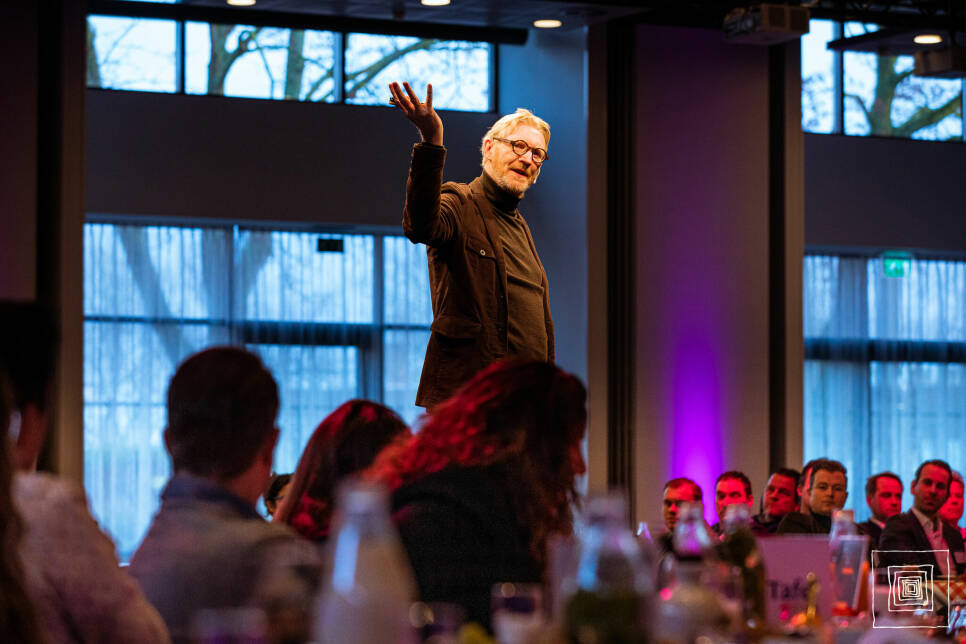8 min
© Chantal Arnts, Chambre Séparée
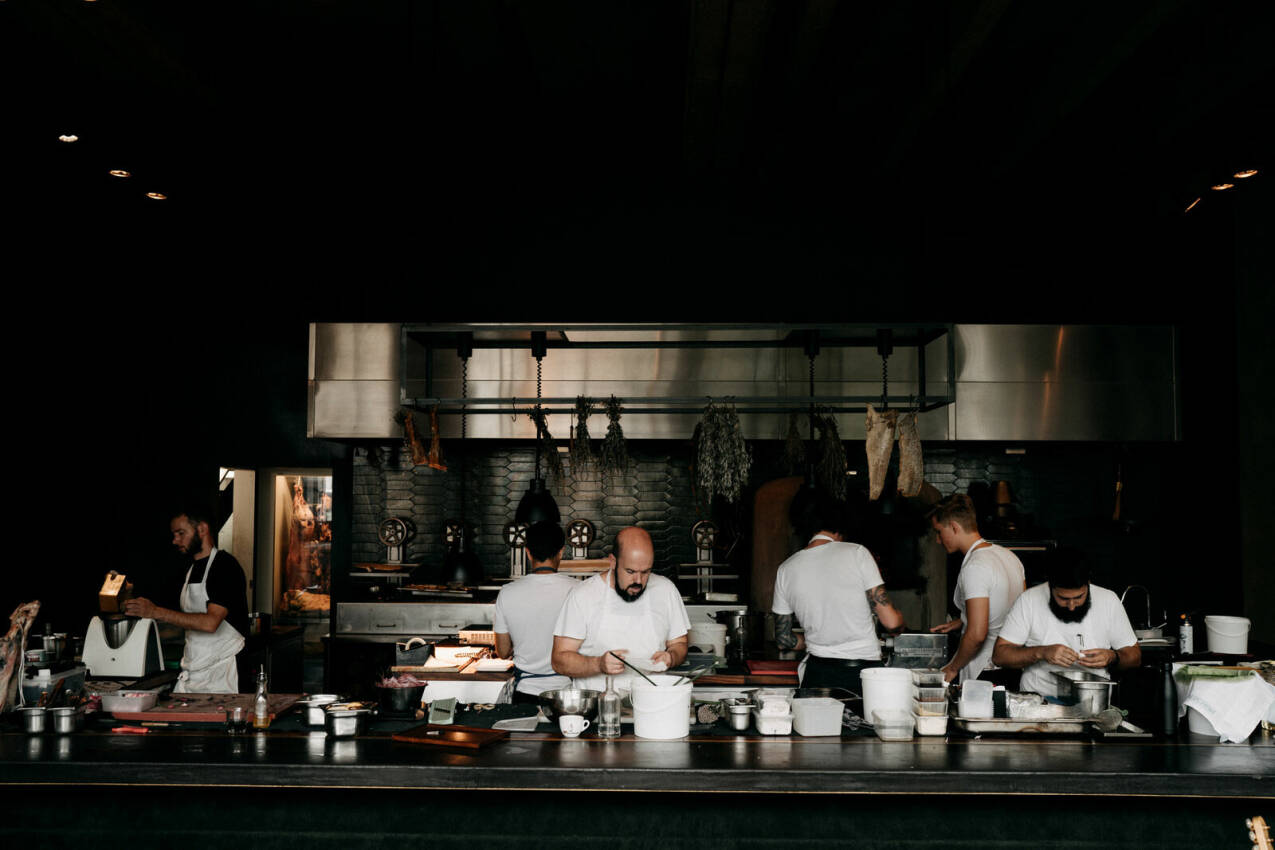
As in restaurant Chambre Séparée, it is the chef who is in charge. And that's also the essence of the set-up of both businesses: the customer is no longer king, but is – in many respects – more generously served! Gert and Joachim call it, borrowed from the Japanese food culture, 'omakase'. The chef directs, not only his kitchen, but also his guests, who still have some say in the selection of drinks. What follows is nothing short of spectacular. A culinary trip in twelve ecstatic courses. The price tag can be called hefty: both lunch and dinner service and excluding the liquid framework, you’re 345 euros lighter per person. Exquisite art comes at a price.
In his book Deep Work: Rules for Focused Success in a Distracted World (2015), computer scientist Cal Newport provides insight into the methods available to regain your focus in a world full of distractions. Deep work should be understood as a skill, but also as a superpower, necessary to ward off mental discomfort in your professional life, such as far-too-much distraction and the resulting atomization (fogginess). Newport gives concrete instructions on how to set up a productive workplace and constrain attention to focus. He recommends working with weekly schedules. Projects should be chopped up into small, bite-sized, actionable tasks. Complete each task in a session with yourself lasting about 90 minutes. Newport believes in the power of rituals to get in touch with your work, but also – and especially – in rituals to let go of your work and relax in a healthy way. Note: relaxation does not equal distraction. Healthy relaxation must be consciously chosen and scheduled.
In the meantime, Desramault's remarkable move has also been prominently followed in Belgium. Gert De Mangeleer and his business partner Joachim Boudens – the embodiment of Belgian gastronomy since the early '10s – reanimated their former three-star restaurant Hertog Jan in October '21. Whereas the original restaurant could still entertain up to 100 people per shift, the reborn version at the Botanical Garden in Antwerp is in many ways an antithesis. The number of tables is limited to five and the number of chairs to twenty-two. The restaurant is open only ten days a month, two shifts a day – by reservation only. The most important change is the mindset of the two founders: the guest's freedom of choice is limited to the decision to choose for De Mangeleer and Boudens.
The chef chooses, the guest's mouth is reduced purely to a taste-determining and 'logistical' function: namely, to ensure that all the lovely food is eaten and the guest is entranced. Tongues may be loosened, but only to chat or cheer. Everyone is to strictly follow the flow of the chef. Ordering a personal favorite or asking the kitchen to make special adaptations is out of the question. Taking snapshots of the preparations or of the interior is in any case strongly discouraged!”

Herman Konings
"The customer is no longer king, but is served more generously."
The panacea was the focus filter: an increasingly narrow vessel in which concentrated perception can be caught and held. The focus filter is an upcoming star in the firmament of contemporary psychology. In times of persistent stimuli, the human ability to concentrate and understand and remember things or events in detail is severely tested. An "omni-lifestyle" full of multitasking, -screening and -streaming has a crumbling effect on our ability to focus.
Researchers at the American Psychological Association found in 2016 that regularly switching between attention-grabbing tasks makes us up to 40% less productive. At the same time, people who are trapped in a kind of Bermuda Triangle between Facebook, Whatsapp and Instagram, in addition to constantly checking their phones, report high stress levels. Psychiatrists at London's Institute of Psychiatry, in turn, saw IQs temporarily drop more by a second screen than by marijuana or a sleepless night. Moreover, our fear of missing out is at the root of many psychological complaints. Our overcrowded lives seem to be suffocating our subconscious, and with it the womb of our creativity. In order to be happy, shouldn't we reclaim some mental space? Kobe Desramault will certainly agree.
© Herman Konings
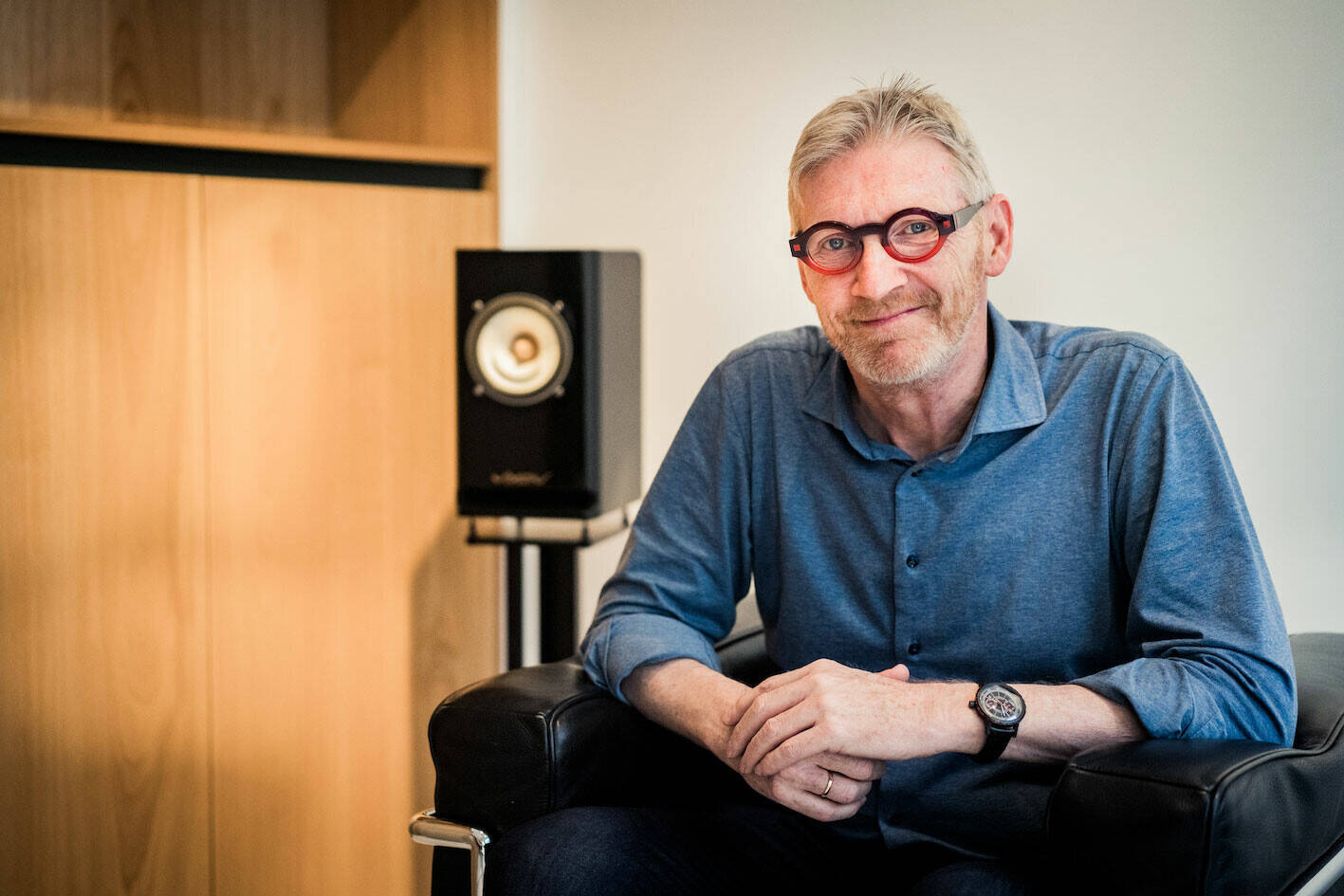

Herman Konings
"An 'omni-lifestyle' full of multitasking, -screening and -streaming has a negative effect on our ability to focus."
In 2016, Kobe Desramault – one of the most creative chefs in the world at the time according to reputable foodie communities – made the drastic decision to dismantle his taste heaven in Dranouter, Belgium, to reset himself socially and mentally and explore new horizons. In 2017, he opened Chambre Séparée, a pop-up restaurant in an old office building waiting to be renovated on Ghent's Oude Beestenmarkt. In 2019 – entirely according to plan and agreement – the pop-down followed. There were only sixteen seats, reservations were limited to a maximum of two persons, and all guests sat shoulder to shoulder at a long dining-bar, facing the open kitchen and watching the chef's skills. You weren't sitting across from your chosen company, whose stories and facial expressions could only distract you. Instead, you sat across a respected flavor wizard facing his wondrous preparations. After all, the focus on the craft and the taste enhances the pleasure of the experience. The message was clear: have respect for the artist's creations!
Kobe had and communicated unequivocally a straightforward plan: two shifts per evening, five nights a week, forty weeks a year. A maximum of 6,400 guests per year, who paid the fixed fee of 200 euros in advance, drinks not included, and who were aware that they would be taking a 120-minute trip to culinary heaven, led by an experienced guide and four sherpas. Requests were out of the question. Code words were "artistry" and "focus filter”. At the end of the ride, there was added value for everyone: the guests were left with an elevated experience, the providers – including the host initiator – had much more time in their private agendas, the company had rosy cash books, job satisfaction was back, creativity and innovation were given oxygen, and through the measured purchase of fresh food, the environment was less impacted.
© Chantal Arnts, Kobe Desramault
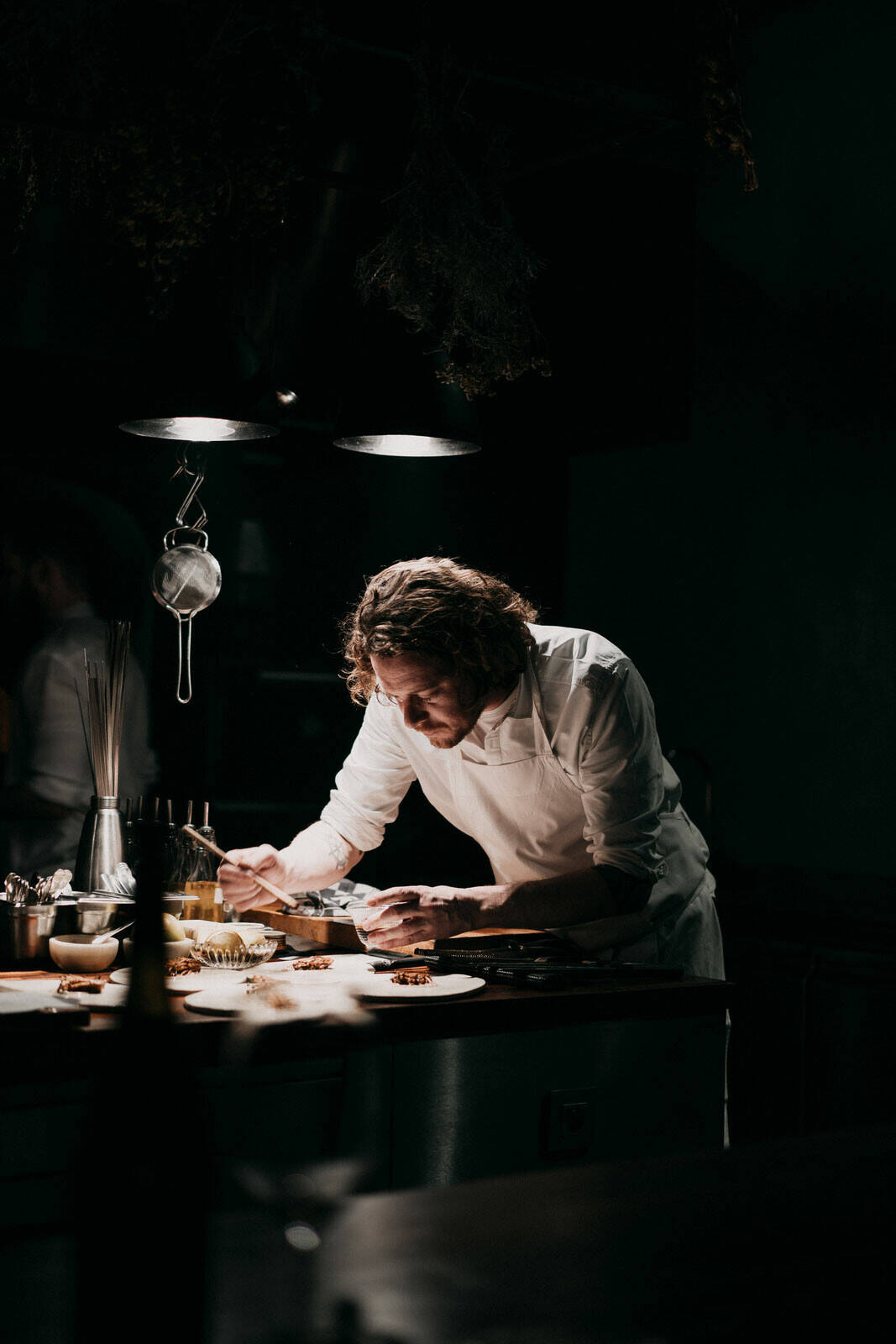
That being said, it reminded me of two young Flemish kitchen heroes: star chefs of world renown, Kobe Desramault and Gert De Mangeleer, to whom I attribute the powers of minimalism. Even before the coronavirus, the two saw the light of lighter, less complex, less taxing and yet more satisfying. Both at some point wanted to escape the pressure of doing everything, everywhere and always being on; they were done with it. The pleasure of creating and pleasing was gone. They spent six long days in a seven day week managing a large kitchen army and always bowing deeply to more demanding, more assertive guests. When could they be present – carefree and attentive – for their children and partners?And what to think of those large amounts of unprocessed supplies of top-quality food that were spilled every day? A waste of money, resources and opportunities.

Herman Konings
"These two young Belgian star chefs saw – even before the coronavirus hit – the light of lighter: less complex, less taxing and yet more satisfying"
In the early summer of 2020 – a few months after imposed restrictions from governments and recommendations to reduce infection rates as a community – two separate groups began to emerge in the wider society. Each with its own baggage of feelings, sighs, wishes and strategic considerations regarding the problem. On the one hand, the 'hedonists', for whom the motivation to adhere to the strict regulations around physical distance and social austerity declined in equal proportion as the outside temperature and the number of hours of daylight increased. On the other hand, there are the 'minimalists' for whom the imposed restrictions may not be a 'blessing' – that would be inappropriate from a human point of view – but certainly a legitimate reason to take a critical look at one's own life (so far), to remove the faltering parts and add new ambitions.
If, for the introvert, the consequences of an imposed change in behavior prove positive, the old habitual behavior will be quickly forgotten and the focus shifted to new horizons and rules of the game. It is expected that it will increase and sharpen their consciousness around purposefulness, quality of life, human (equal) dignity and more critical consumption. The minimalist also seems more fond of the short-chain economy – not only, for example, to undo the scarcity of energy or raw materials created by geopolitical decisions or to be able to repair their battered economy locally, but also to be able to restore the natural state of our planet.
Behavioral scientists – I have been a member of this guild since 1989 – believe they can qualify the current pandemic state of emergency as a 'hedonism crisis', because the typically human need for uninhibited, collective joy has been adding fuel to the virus. Exuberance and pleasure are not only at the root of the crisis, but are also its victims. The fact that the leisure business and sectors of tourism, events, sports and hospitality have been hit hard particularly, justifies the description.
Herman Konings Xiao Er Kong
Herman Konings is a behavioral scientist and trend analyst. He has been managing the Antwerp trend and future research agency Pocket Marketing/nXt since 1992. Being a passionate storyteller, Konings writes for Food Inspiration about trends that catch his eye.
Behavioral scientist Herman Konings flags a new trend
The power of focus in a world full distractions: the focus filter
expert opinion





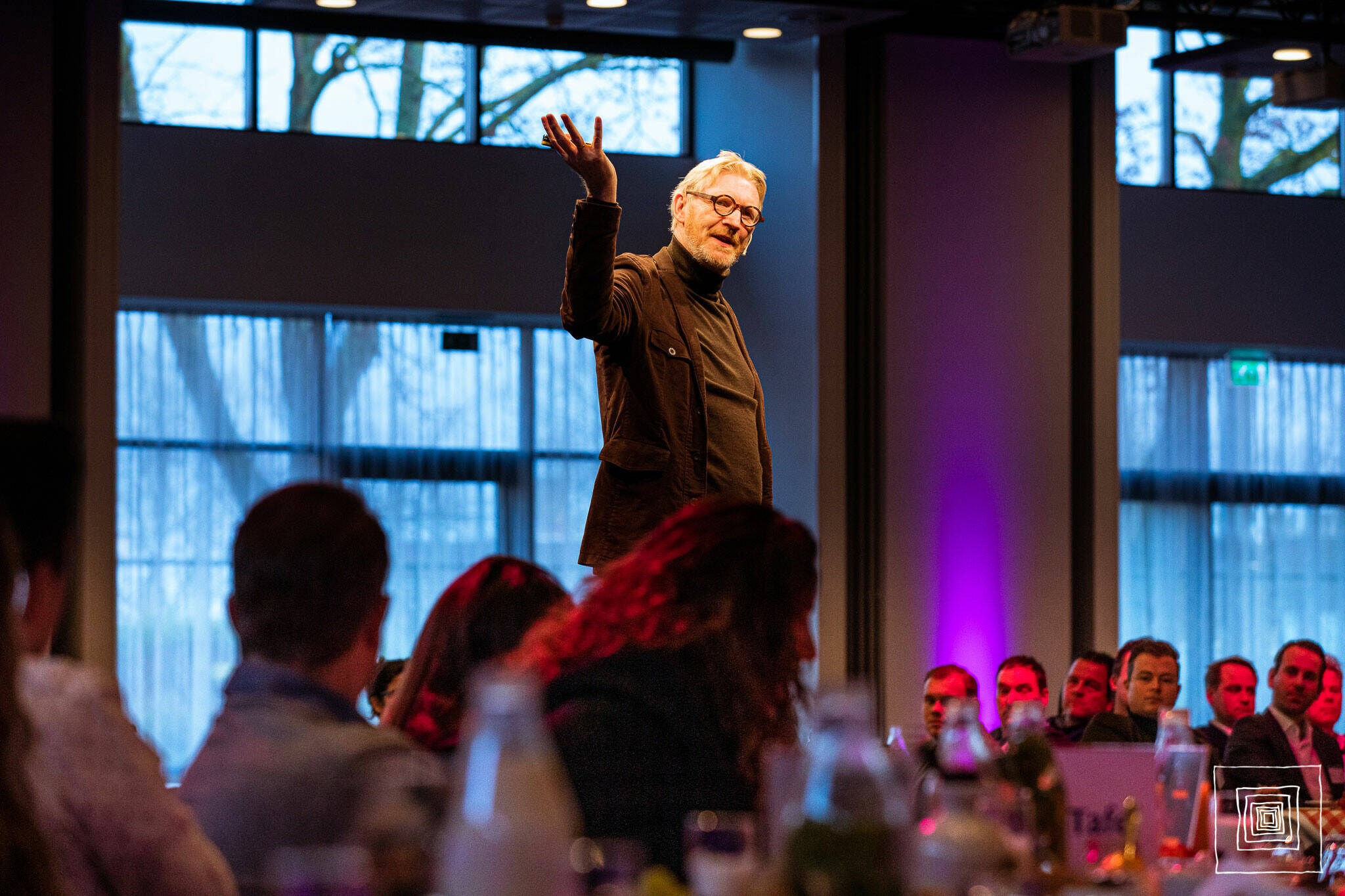
As in restaurant Chambre Séparée, it is the chef who is in charge. And that's also the essence of the set-up of both businesses: the customer is no longer king, but is – in many respects – more generously served! Gert and Joachim call it, borrowed from the Japanese food culture, 'omakase'. The chef directs, not only his kitchen, but also his guests, who still have some say in the selection of drinks. What follows is nothing short of spectacular. A culinary trip in twelve ecstatic courses. The price tag can be called hefty: both lunch and dinner service and excluding the liquid framework, you’re 345 euros lighter per person. Exquisite art comes at a price.
In his book Deep Work: Rules for Focused Success in a Distracted World (2015), computer scientist Cal Newport provides insight into the methods available to regain your focus in a world full of distractions. Deep work should be understood as a skill, but also as a superpower, necessary to ward off mental discomfort in your professional life, such as far-too-much distraction and the resulting atomization (fogginess). Newport gives concrete instructions on how to set up a productive workplace and constrain attention to focus. He recommends working with weekly schedules. Projects should be chopped up into small, bite-sized, actionable tasks. Complete each task in a session with yourself lasting about 90 minutes. Newport believes in the power of rituals to get in touch with your work, but also – and especially – in rituals to let go of your work and relax in a healthy way. Note: relaxation does not equal distraction. Healthy relaxation must be consciously chosen and scheduled.
© Chantal Arnts, Chambre Séparée
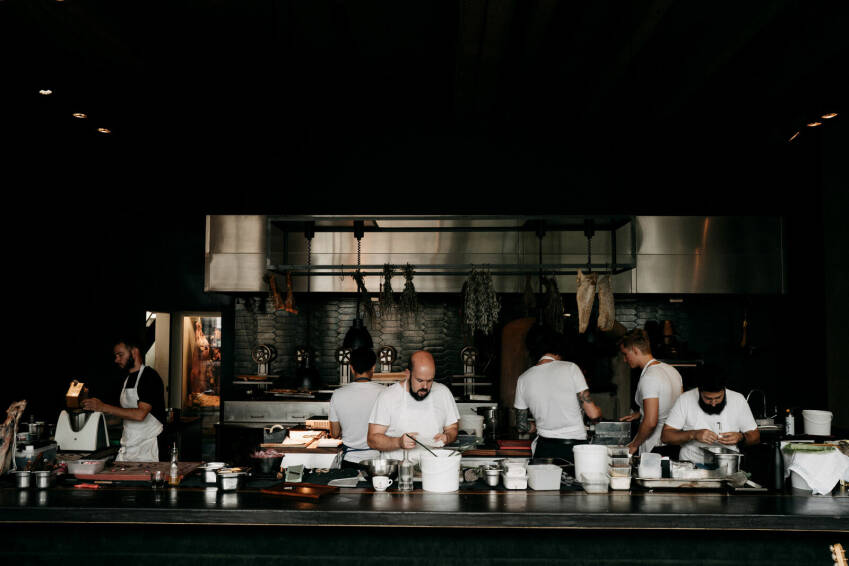
© Herman Konings
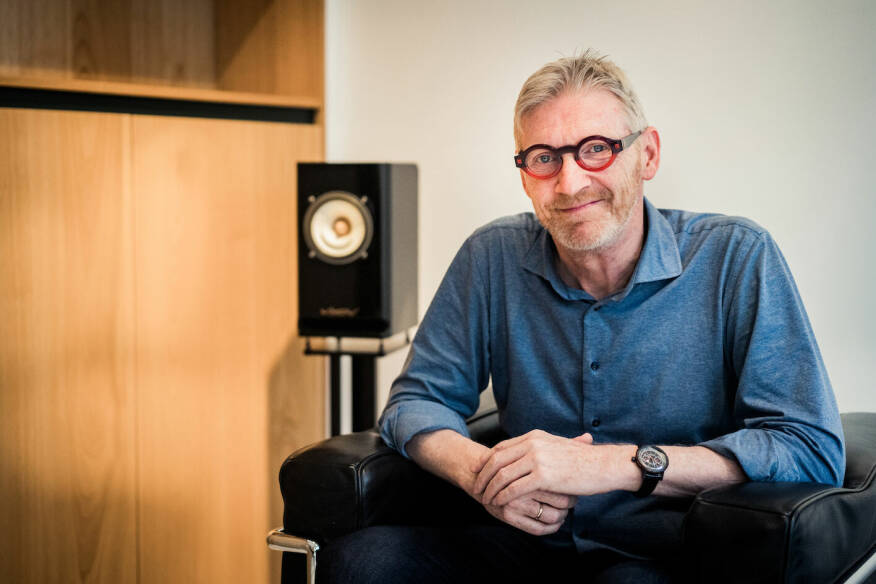
In the meantime, Desramault's remarkable move has also been prominently followed in Belgium. Gert De Mangeleer and his business partner Joachim Boudens – the embodiment of Belgian gastronomy since the early '10s – reanimated their former three-star restaurant Hertog Jan in October '21. Whereas the original restaurant could still entertain up to 100 people per shift, the reborn version at the Botanical Garden in Antwerp is in many ways an antithesis. The number of tables is limited to five and the number of chairs to twenty-two. The restaurant is open only ten days a month, two shifts a day – by reservation only. The most important change is the mindset of the two founders: the guest's freedom of choice is limited to the decision to choose for De Mangeleer and Boudens.
The chef chooses, the guest's mouth is reduced purely to a taste-determining and 'logistical' function: namely, to ensure that all the lovely food is eaten and the guest is entranced. Tongues may be loosened, but only to chat or cheer. Everyone is to strictly follow the flow of the chef. Ordering a personal favorite or asking the kitchen to make special adaptations is out of the question. Taking snapshots of the preparations or of the interior is in any case strongly discouraged!”

Herman Konings
"The customer is no longer king, but is served more generously."
The panacea was the focus filter: an increasingly narrow vessel in which concentrated perception can be caught and held. The focus filter is an upcoming star in the firmament of contemporary psychology. In times of persistent stimuli, the human ability to concentrate and understand and remember things or events in detail is severely tested. An "omni-lifestyle" full of multitasking, -screening and -streaming has a crumbling effect on our ability to focus.
Researchers at the American Psychological Association found in 2016 that regularly switching between attention-grabbing tasks makes us up to 40% less productive. At the same time, people who are trapped in a kind of Bermuda Triangle between Facebook, Whatsapp and Instagram, in addition to constantly checking their phones, report high stress levels. Psychiatrists at London's Institute of Psychiatry, in turn, saw IQs temporarily drop more by a second screen than by marijuana or a sleepless night. Moreover, our fear of missing out is at the root of many psychological complaints. Our overcrowded lives seem to be suffocating our subconscious, and with it the womb of our creativity. In order to be happy, shouldn't we reclaim some mental space? Kobe Desramault will certainly agree.
In 2016, Kobe Desramault – one of the most creative chefs in the world at the time according to reputable foodie communities – made the drastic decision to dismantle his taste heaven in Dranouter, Belgium, to reset himself socially and mentally and explore new horizons. In 2017, he opened Chambre Séparée, a pop-up restaurant in an old office building waiting to be renovated on Ghent's Oude Beestenmarkt. In 2019 – entirely according to plan and agreement – the pop-down followed. There were only sixteen seats, reservations were limited to a maximum of two persons, and all guests sat shoulder to shoulder at a long dining-bar, facing the open kitchen and watching the chef's skills. You weren't sitting across from your chosen company, whose stories and facial expressions could only distract you. Instead, you sat across a respected flavor wizard facing his wondrous preparations. After all, the focus on the craft and the taste enhances the pleasure of the experience. The message was clear: have respect for the artist's creations!
Kobe had and communicated unequivocally a straightforward plan: two shifts per evening, five nights a week, forty weeks a year. A maximum of 6,400 guests per year, who paid the fixed fee of 200 euros in advance, drinks not included, and who were aware that they would be taking a 120-minute trip to culinary heaven, led by an experienced guide and four sherpas. Requests were out of the question. Code words were "artistry" and "focus filter”. At the end of the ride, there was added value for everyone: the guests were left with an elevated experience, the providers – including the host initiator – had much more time in their private agendas, the company had rosy cash books, job satisfaction was back, creativity and innovation were given oxygen, and through the measured purchase of fresh food, the environment was less impacted.
© Chantal Arnts, Kobe Desramault
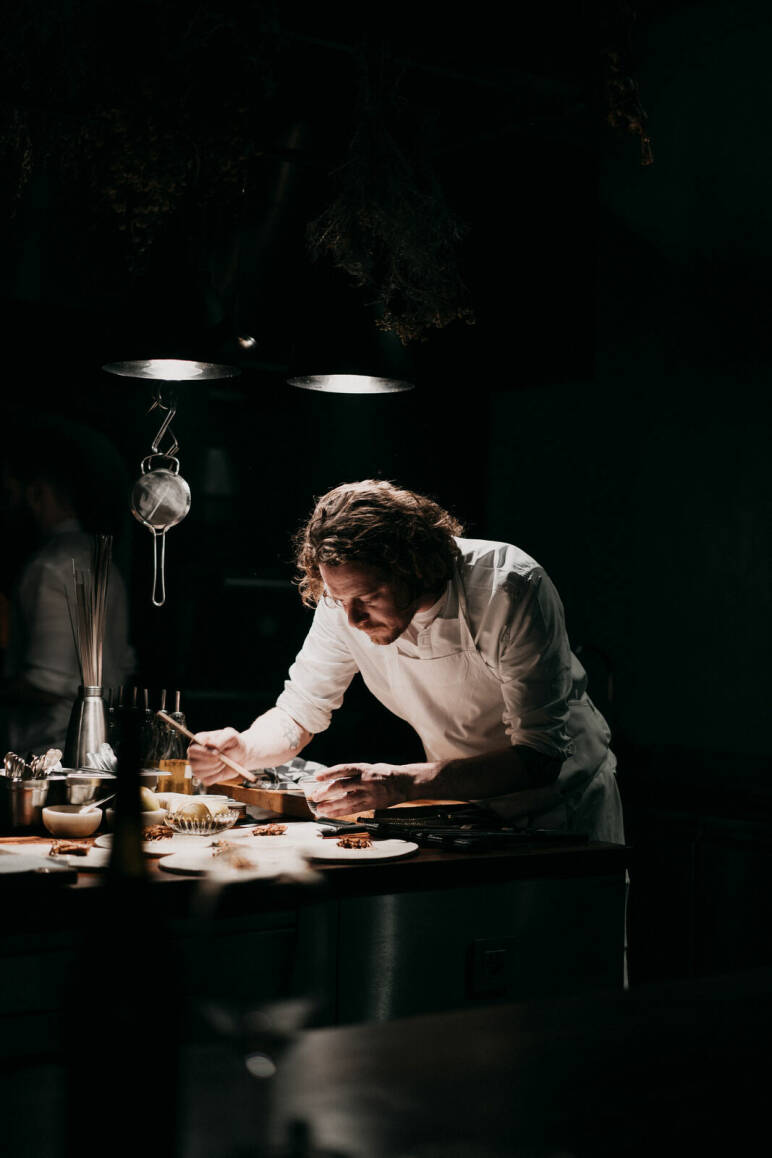
That being said, it reminded me of two young Flemish kitchen heroes: star chefs of world renown, Kobe Desramault and Gert De Mangeleer, to whom I attribute the powers of minimalism. Even before the coronavirus, the two saw the light of lighter, less complex, less taxing and yet more satisfying. Both at some point wanted to escape the pressure of doing everything, everywhere and always being on; they were done with it. The pleasure of creating and pleasing was gone. They spent six long days in a seven day week managing a large kitchen army and always bowing deeply to more demanding, more assertive guests. When could they be present – carefree and attentive – for their children and partners?And what to think of those large amounts of unprocessed supplies of top-quality food that were spilled every day? A waste of money, resources and opportunities.

Herman Konings
"These two young Belgian star chefs saw – even before the coronavirus hit – the light of lighter: less complex, less taxing and yet more satisfying"
In the early summer of 2020 – a few months after imposed restrictions from governments and recommendations to reduce infection rates as a community – two separate groups began to emerge in the wider society. Each with its own baggage of feelings, sighs, wishes and strategic considerations regarding the problem. On the one hand, the 'hedonists', for whom the motivation to adhere to the strict regulations around physical distance and social austerity declined in equal proportion as the outside temperature and the number of hours of daylight increased. On the other hand, there are the 'minimalists' for whom the imposed restrictions may not be a 'blessing' – that would be inappropriate from a human point of view – but certainly a legitimate reason to take a critical look at one's own life (so far), to remove the faltering parts and add new ambitions.
If, for the introvert, the consequences of an imposed change in behavior prove positive, the old habitual behavior will be quickly forgotten and the focus shifted to new horizons and rules of the game. It is expected that it will increase and sharpen their consciousness around purposefulness, quality of life, human (equal) dignity and more critical consumption. The minimalist also seems more fond of the short-chain economy – not only, for example, to undo the scarcity of energy or raw materials created by geopolitical decisions or to be able to repair their battered economy locally, but also to be able to restore the natural state of our planet.
Behavioral scientists – I have been a member of this guild since 1989 – believe they can qualify the current pandemic state of emergency as a 'hedonism crisis', because the typically human need for uninhibited, collective joy has been adding fuel to the virus. Exuberance and pleasure are not only at the root of the crisis, but are also its victims. The fact that the leisure business and sectors of tourism, events, sports and hospitality have been hit hard particularly, justifies the description.

Herman Konings
"An 'omni-lifestyle' full of multitasking, -screening and -streaming has a negative effect on our ability to focus."
Herman Konings Xiao Er Kong
Herman Konings is a behavioral scientist and trend analyst. He has been managing the Antwerp trend and future research agency Pocket Marketing/nXt since 1992. Being a passionate storyteller, Konings writes for Food Inspiration about trends that catch his eye.
Behavioral scientist Herman Konings flags a new trend
The power of focus in a world full distractions: the focus filter







8 min
